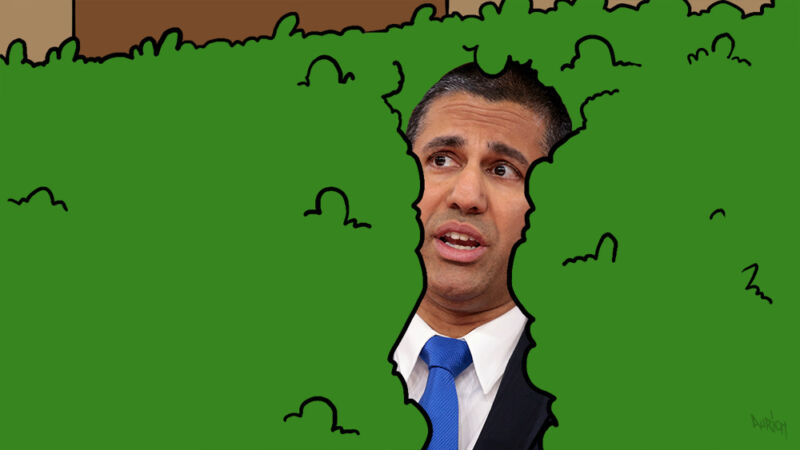
Federal Communications Commission Chairman Ajit Pai said he is dropping his plan to help President Trump impose a crackdown on social-media platforms and offered mild criticism of Trump’s incitement of a mob that stormed the US Capitol in a failed bid to overturn the election results.
In October, Pai backed Trump’s proposal to limit the Section 230 legal protections for social-media websites that block or modify content posted by users. At the time, Pai said he would open an FCC rule-making process to declare that companies like Twitter and Facebook do not have “special immunity” for their content-moderation decisions. But Pai hasn’t moved the proposal forward since Trump’s election loss and has now stated in an interview that he won’t finalize the plan.
“The status is that I do not intend to move forward with the notice of proposed rule-making [to reinterpret Section 230] at the FCC,” Pai said in an interview published yesterday by Protocol. “The reason is, in part, because given the results of the election, there’s simply not sufficient time to complete the administrative steps necessary in order to resolve the rule-making. Given that reality, I do not believe it’s appropriate to move forward.” Pai announced shortly after Trump’s election loss that he will leave the FCC on January 20, President-elect Joe Biden’s inauguration day.
Section 230 of the Communications Decency Act is a US law that says providers and users of interactive computer services shall not be held liable for “any action voluntarily taken in good faith to restrict access to or availability of material that the provider or user considers to be obscene, lewd, lascivious, filthy, excessively violent, harassing, or otherwise objectionable, whether or not such material is constitutionally protected.” Before abandoning his plan, Pai said that social-media companies “do not have a First Amendment right to a special immunity denied to other media outlets, such as newspapers and broadcasters,” but both conservative and liberal opponents of his plan said the FCC does not have constitutional authority to reinterpret the statute.
Pai: Seeking election reversal was “terrible mistake”
On Wednesday this week, as Congress met to certify Biden’s election win, the US Capitol was stormed by a mob incited by Trump’s false claims that the election was stolen from him. Trump used social media to spread his baseless claims, and his posting privileges were suspended by Facebook and Instagram, while Twitter removed several of this incendiary tweets. Trump had wanted the FCC to crack down on the social-media companies to prevent Facebook and Twitter from moderating his posts.
Protocol reporter Emily Birnbaum asked Pai if he thinks Trump “bears any responsibility” for the “violence and chaos [that] erupt[ed] on Capitol Hill, perpetuated by Trump supporters in his name.” Pai did not mention Trump by name in his response but said it was a “mistake” to suggest that the election results could be changed:
The scenes we saw yesterday were outrageous and extremely disappointing to those of us who cherish American democracy, one hallmark of which is the peaceful transition of power. To answer your question, I think it was a terrible mistake to suggest that the results of the election, and particularly the process that culminated yesterday in the Senate and the House, could in any way be changed. That was a terrible mistake and one that I do not think in any way should have been indulged.
Birnbaum pressed Pai for a more direct condemnation of Trump, asking, “Do you think that the president’s indulgence of those theories was in part responsible for what happened?” Pai’s response to this question focused on the rioters without mentioning Trump:
I haven’t studied all the statements that were made and actions that were taken. I was following it as closely as I could on television. But all I’ll say is, given the circumstances that we saw—armed guards defending the Senate chamber, people wielding Confederate flags in the seat of the United States government—it was completely unacceptable, completely outrageous. We must be governed by the rule of law, not by the rule of the mob. Law and order must be restored and democracy must be respected. Those are the bedrock expectations of every American citizen. It is what distinguishes democracy from other governments around the world. I believe that to my core, regardless of political affiliation or circumstance.
Pai still concerned about social-media moderation
Pai said he is still concerned about social-media moderation decisions and is open to new regulations. “What I will say is what I said [in] November of 2017, long before this was a dominant strain in the dominant discourse: Social media increasingly defines the public square when it comes to political speech,” Pai told Protocol. “We need more transparency and understanding how some of these decisions are made, how certain content is allowed or not allowed on these platforms.” Elected officials must consider that lack of transparency “as they’re thinking about whether and how to regulate social media companies,” Pai said.
Despite that, Pai did not criticize Facebook and Twitter for restricting Trump this week. When asked if he “agree[s] with Facebook and Twitter’s decision to pull the president off of social media,” Pai responded, “Given the circumstances we saw yesterday, I’m not going to second-guess those decisions.”
Although Democrats on the FCC opposed Pai’s Section 230 push, saying the commission shouldn’t become Trump’s “speech police,” Biden called for the repeal of Section 230 a year ago.
Pai expects Congress to take action. “There’s now a bipartisan consensus among elected officials that the law should be changed,” he said. “Obviously the president believes it should be repealed, President-elect Biden has campaigned repeatedly on its repeal, but within Congress there appears to be a consensus also that it should be revised or reformed in some way.” Pai said it is “a very complicated issue” and “I personally would think about it more carefully in terms of the immunity provision” but said the decision will rest with Congress and the Biden administration.
https://arstechnica.com/?p=1733764

